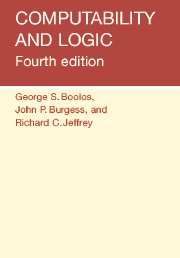Book contents
- Frontmatter
- Contents
- Preface
- COMPUTABILITY THEORY
- BASIC METALOGIC
- 9 A Précis of First-Order Logic: Syntax
- 10 A Précis of First-Order Logic: Semantics
- 11 The Undecidability of First-Order Logic
- 12 Models
- 13 The Existence of Models
- 14 Proofs and Completeness
- 15 Arithmetization
- 16 Representability of Recursive Functions
- 17 Indefinability, Undecidability, Incompleteness
- 18 The Unprovability of Consistency
- FURTHER TOPICS
- Hints for Selected Problems
- Annotated Bibliography
- Index
18 - The Unprovability of Consistency
Published online by Cambridge University Press: 05 June 2012
- Frontmatter
- Contents
- Preface
- COMPUTABILITY THEORY
- BASIC METALOGIC
- 9 A Précis of First-Order Logic: Syntax
- 10 A Précis of First-Order Logic: Semantics
- 11 The Undecidability of First-Order Logic
- 12 Models
- 13 The Existence of Models
- 14 Proofs and Completeness
- 15 Arithmetization
- 16 Representability of Recursive Functions
- 17 Indefinability, Undecidability, Incompleteness
- 18 The Unprovability of Consistency
- FURTHER TOPICS
- Hints for Selected Problems
- Annotated Bibliography
- Index
Summary
According to Gödel's second incompleteness theorem, the sentence expressing that a theory likePis consistent is undecidable byP, supposingPis consistent. The full proof of this result is beyond the scope of a book on the level of the present one, but the overall structure of the proof and main ingredients that go into the proof will be indicated in this short chapter. In place of problems there are some historical notes at the end.
Officially we defined T to be inconsistent if every sentence is provable from T, though we know this is equivalent to various other conditions, notably that for some sentence S, both S and ~S are provable from T. If T is an extension of Q, then since 0 ≠ 1 is the simplest instance of the first axiom of Q, 0 ≠ 1 is provable from T, and if 0 = 1 is also provable from T, then T is inconsistent; while if T is inconsistent, then 0 = 1 is provable from T, since every sentence is. Thus T is consistent if and only if 0 = 1 is not provable from T. We call ~PrvT(), which is to say ~∃y PrfT(, y), the consistency sentence for T. Historically, the original paper of Gödel containing his original version of the first incompleteness theorem (corresponding to our Theorem 17.9) included towards the end a statement of a version of the following theorem.
- Type
- Chapter
- Information
- Computability and Logic , pp. 233 - 240Publisher: Cambridge University PressPrint publication year: 2002



